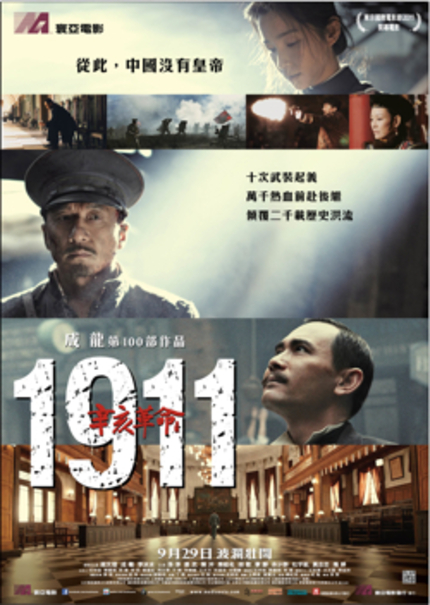1911 REVOLUTION Review

But this is where the problems with 1911 REVOLUTION begin...
At no point during the film is it apparent that the filmmakers feel confident their audience is familiar with the events up on the screen. The past few years have proved strangely fascinating for cinema goers previously unfamiliar with China's recent history, as we have since had it crammed down our throats in painstaking detail in almost every period drama to be released since the new millennium. Action is all too often sidestepped in favour of recreating a negotiation or rousing propaganda moment, and 1911's screenwriters Wang Xingdong and Chen Baoguang seem infinitely more interested in documenting the efforts of Dr. Sun Yat Sen (Winston Chao) to raise cash for the revolution overseas, or the machinations of the Empress Dowager (Joan Chen) as she struggles to uphold her sovereignty, than in dramatising the blood-soaked struggles of Huang Xing (Jackie Chan) on the front line. The obvious result of this approach is turning an epic and violent period of national upheaval into a frustratingly dull and tedious series of negotiations behind closed doors.
Originally billed first and foremost as Jackie Chan's 100th starring role, what is most disappointing from the finished film is just how anonymous the actor is up on screen. It is unclear at what stage exactly it was decided that Huang Xing's story should take a back seat in favour of the more widely known and arguably less interesting struggles of Sun Yat Sen, but after 120 minutes audiences will come away knowing precious little more about the man and his motivations than they did going in. There is even a relationship between Huang Xing and fellow revolutionary Xu Zonghan (Li Bing Bing) that spans the entire movie yet somehow is never given any attention.
Billed as "General Director", Jackie Chan's role in the film, both in front of and behind the camera seems incredibly unclear and his involvement in the project appears now to be highlighted solely to attract an international audience to what is otherwise just another history lesson from the Chinese government. Sadly, fans of Chan's previous 99 films will be left desperately wanting as he really serves as little more than "Dr. Sun's more military-inclined best friend", with no chance to display any of his trademark wit, athleticism or even given the chance to work on those "serious acting" chops he was so desperate to showcase in THE SHINJUKU INCIDENT.
The takeaway from 1911 REVOLUTION is disappointingly similar to that of the officially commissioned FOUNDING OF A REPUBLIC and BEGINNING OF THE GREAT REVIVIAL - technically impressive pieces of grandiose filmmaking that have little or no grasp of how to tell a story without devolving into simply chronicling real-life events in sequence. China needs to seriously rethink how it depicts its history onscreen and learn to take dramatic license and tell involving stories, because if it continues to churn out these vacuous, barren, joyless epics it runs the risk of inciting a whole new generation to start a revolution of their own.

Do you feel this content is inappropriate or infringes upon your rights? Click here to report it, or see our DMCA policy.






